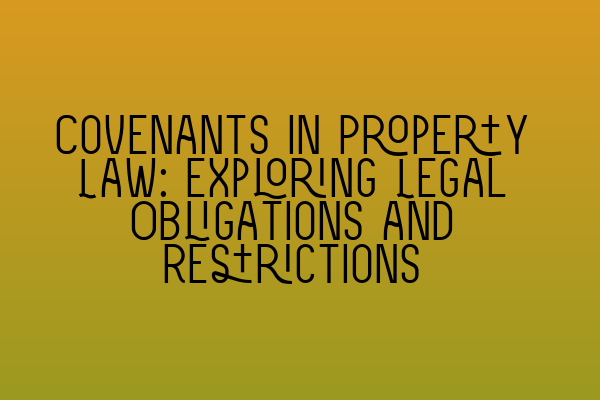Covenants in Property Law: Exploring Legal Obligations and Restrictions
When it comes to property law, covenants are a crucial aspect that both property owners and prospective buyers need to understand. Covenants refer to legal obligations and restrictions that are attached to a property and can have significant implications for property transactions and usage. In this article, we will dive deep into the world of covenants, exploring their types, enforcement, and the implications they have on property owners.
Before we proceed, it’s important to note that property law can be complex, and it is always advisable to seek professional legal advice for your specific situation. SQE Property Law & Land Law provides comprehensive legal services to help navigate through all property-related matters.
Understanding Property Covenants
A property covenant is a legally binding agreement that imposes restrictions or obligations on a property’s owner. These covenants are typically created during the initial purchase of the property and are recorded in the property’s title deeds. Covenants can be imposed by various entities, such as developers, local government bodies, or previous owners, to regulate the use, development, and maintenance of the property.
Types of Covenants
There are two main types of covenants: positive covenants and restrictive covenants.
Positive Covenants: Positive covenants require the property owner to take certain actions, such as maintaining the property or contributing to the cost of shared amenities or services. Examples of positive covenants include the obligation to repair shared access roads, contribute to the maintenance of a communal garden, or pay annual service charges for shared facilities in a housing estate.
Restrictive Covenants: Restrictive covenants, on the other hand, prevent property owners from taking specific actions or using the property in certain ways. These restrictions aim to maintain the character, value, and aesthetics of a property or the surrounding area. Common examples of restrictive covenants include limitations on property use (e.g. commercial use in a residential area), restrictions on height or size of buildings, or prohibitions on alterations or extensions without prior approval.
Enforcing Covenants
Enforcement of covenants can be a complex process, often requiring legal intervention. The parties entitled to enforce a covenant may vary depending on the specific terms outlined in the covenant. In some cases, it may be the original covenantor or covenantee, while in other instances, it could be successors in title or designated management bodies.
In situations where a property owner breaches a covenant, affected parties can seek legal remedies, such as injunctions, damages, or specific performance. The court will consider various factors, including the intention of the covenant, the impact of the breach, and the reasonableness of the covenant’s terms.
Implications for Property Owners
Property covenants can have significant implications for property owners. They can limit the use or development of the property, restrict certain activities or alterations, and even affect property values. It is important for property owners, especially those considering new purchases, to thoroughly review and understand the covenants associated with a property. Failing to comply with these covenants can lead to legal disputes, financial penalties, and hinder property transactions.
Seeking Professional Legal Advice
With the complexities involved in property covenants, it is always advisable to seek professional legal advice. SQE Property Law & Land Law offers expert legal services to guide you through the intricacies of property law. Their team of experienced solicitors can help with covenant interpretation, negotiation, enforcement, and resolution of related disputes. Working with professionals ensures that you are aware of your rights and obligations and helps protect your interests in any property transaction.
Conclusion
Covenants in property law play a crucial role in regulating the use and development of properties. Understanding the different types of covenants, their enforcement, and the implications they have on property owners is essential for smooth property transactions and compliance with legal obligations. If you have any further questions or need assistance with property law matters, don’t hesitate to contact SQE Property Law & Land Law for expert legal guidance.
Related Articles:
– SQE 1 Practice Exam Questions
– SQE 1 Practice Mocks FLK1 FLK2
– SQE 2 Preparation Courses
– SQE 1 Preparation Courses
– SRA SQE Exam Dates
